Burt A. The Evolution of the British Empire and Commonwealth From the American Revolution
Подождите немного. Документ загружается.

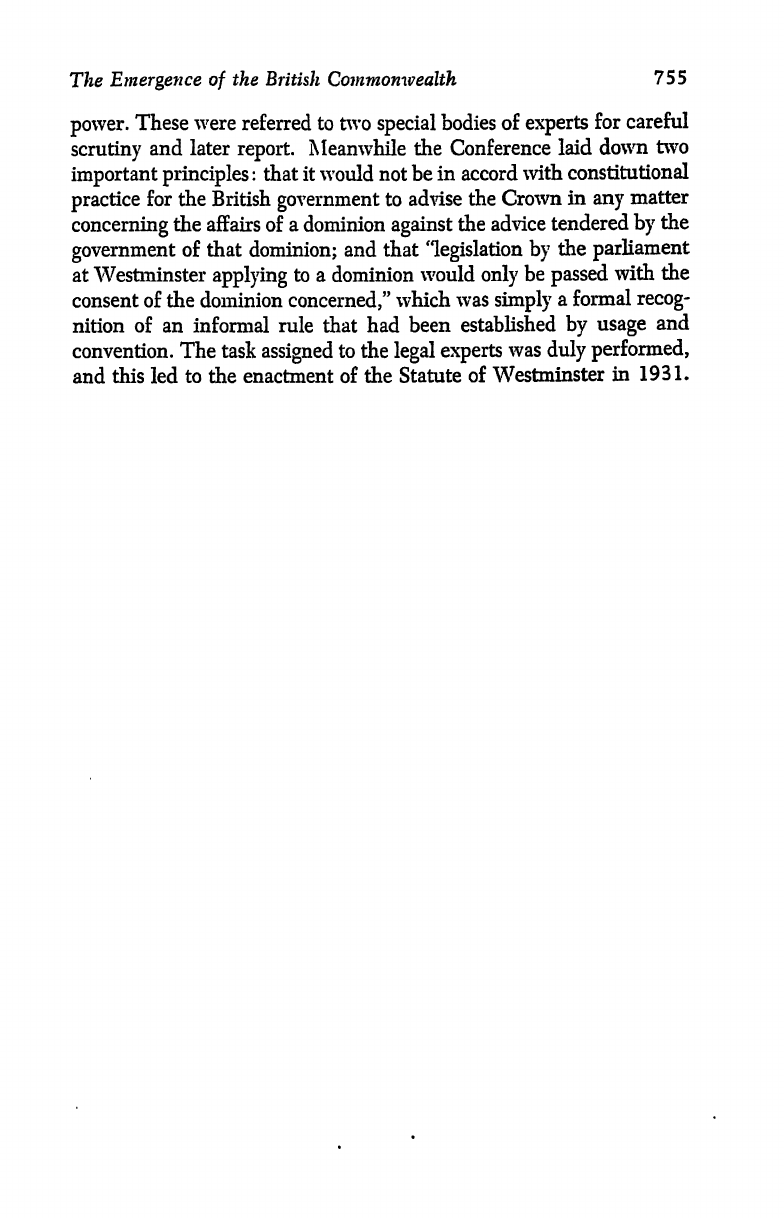
The
Emergence
of
the British
Commonwealth
755
power.
These were
referred to
two
special
bodies of
experts
for careful
scrutiny
and
later
report.
Meanwhile
the
Conference
laid
down
two
important principles
:
that it
would
not
be
in accord
with
constitutional
practice
for the British
government
to
advise
the Crown
in
any
matter
concerning
the affairs
of
a
dominion
against
the advice
tendered
by
the
government
of
that
dominion;
and
that
"legislation
by
the
parliament
at
Westminster
applying
to a dominion
would
only
be
passed
with
the
consent
of the
dominion
concerned,"
which
was
simply
a formal
recog-
nition
of an informal rule that had
been
established
by
usage
and
convention. The task
assigned
to
the
legal
experts
was
duly performed,
and
this
led
to
the enactment of
the Statute
of Westminster
in
1931.
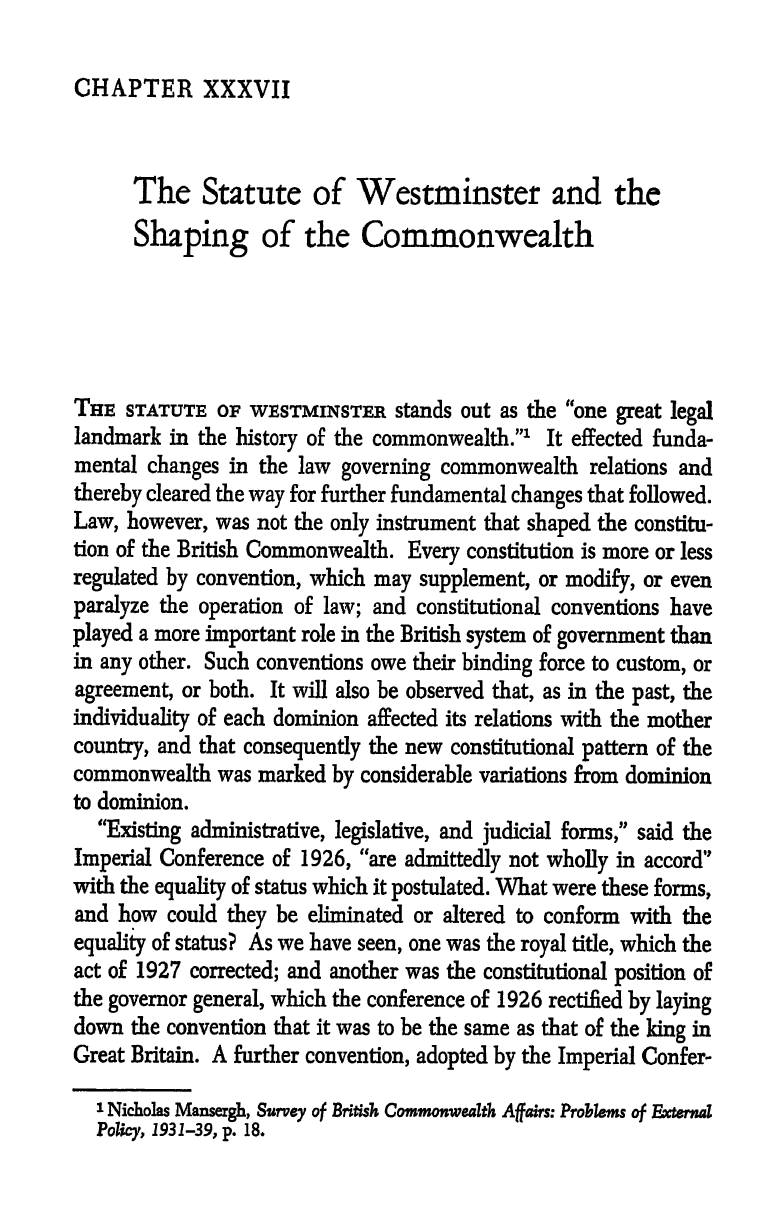
CHAPTER
XXXVII
The
Statute of Westminster and
the
Shaping
of
the Commonwealth
THE
STATUTE
OF
WESTMINSTER stands out
as
the "one
great
legal
landmark
in
the
history
of the
commonwealth."
1
It
effected
funda-
mental
changes
in
the law
governing
commonwealth
relations
and
thereby
cleared
the
way
for
further
fundamental
changes
that
followed.
Law,
however,
was
not
the
only
instrument that
shaped
the
constitu-
tion
of the
British
Commonwealth.
Every
constitution is
more
or
less
regulated by
convention,
which
may supplement,
or
modify,
or
even
paralyze
the
operation
of
law;
and
constitutional
conventions
have
played
a
more
important
role
in the British
system
of
government
than
in
any
other.
Such
conventions
owe their
binding
force to
custom,
or
agreement,
or
both. It
will also
be
observed
that,
as in
the
past,
the
individuality
of
each dominion
affected
its
relations with
the
mother
country,
and
that
consequently
the
new
constitutional
pattern
of
the
commonwealth was
marked
by
considerable
variations
from
dominion
to
dominion.
"Existing
administrative,
legislative,
and
judicial
forms,"
said the
Imperial
Conference
of
1926,
"are
admittedly
not
wholly
in
accord
1
'
with the
equality
of status
which it
postulated.
What
were
these
forms,
and
how could
they
be
eliminated or
altered to
conform with
the
equality
of
status? As
we
have
seen,
one
was
the
royal
title,
which
the
act
of
1927
corrected;
and another
was the
constitutional
position
of
the
governor general,
which
the
conference
of 1926
rectified
by
laying
down
the
convention that it
was to be the
same
as that
of the
king
in
Great Britain.
A
further
convention,
adopted
by
the
Imperial
Confer-
1
Nicholas
Manserzh,
Survey of
British
Commonwealth
Affairs:
Problems
of
External
Policy,
1931-39,
p.
18*
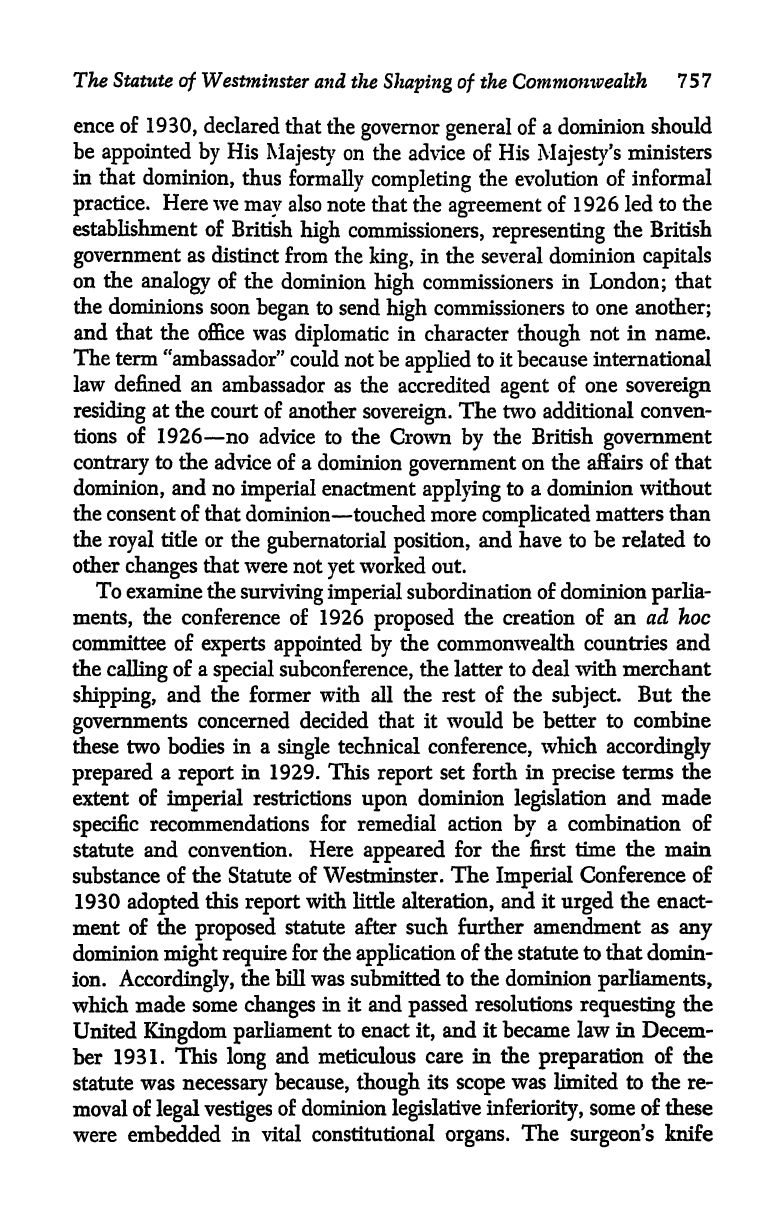
The Statute
of
Westminster and
the
Shaping
of
the
Commonwealth
757
ence
of
1930,
declared
that
the
governor general
of
a dominion
should
be
appointed by
His
Majesty
on
the advice of His
Majesty's
ministers
in that
dominion,
thus
formally
completing
the evolution
of
informal
practice.
Here we
may
also
note that
the
agreement
of
1926 led
to
the
establishment
of
British
high
commissioners,
representing
the
British
government
as
distinct
from
the
king,
in
the
several dominion
capitals
on
the
analogy
of the
dominion
high
commissioners
in
London;
that
the dominions
soon
began
to send
high
commissioners
to
one
another;
and that the
office
was
diplomatic
in character
though
not in
name.
The
term
"ambassador"
could not be
applied
to
it
because
international
law defined an
ambassador as
the
accredited
agent
of one
sovereign
residing
at
the
court
of another
sovereign.
The two additional
conven-
tions
of
1926
no advice to the
Crown
by
the
British
government
contrary
to
the
advice of a
dominion
government
on the affairs of
that
dominion,
and no
imperial
enactment
applying
to a dominion
without
the consent
of
that dominion
touched more
complicated
matters
than
the
royal
title or
the
gubernatorial position,
and
have to be related
to
other
changes
that were
not
yet
worked
out.
To
examine the
surviving
imperial
subordination
of dominion
parlia-
ments,
the
conference of
1926
proposed
the creation of an
ad hoc
committee of
experts
appointed
by
the commonwealth
countries
and
the
calling
of
a
special
subconference,
the latter
to deal
with merchant
shipping,
and
the former
with all
the rest
of
the
subject.
But
the
governments
concerned decided
that it
would be better
to
combine
these two
bodies
in a
single
technical
conference,
which
accordingly
prepared
a
report
in 1929. This
report
set forth
in
precise
terms
die
extent
of
imperial
restrictions
upon
dominion
legislation
and
made
specific
recommendations for
remedial action
by
a combination
of
statute and convention.
Here
appeared
for
the
first time
the
main
substance
of
the
Statute
of Westminster. The
Imperial
Conference
of
1930
adopted
this
report
with little
alteration,
and
it
urged
the enact-
ment
of
the
proposed
statute
after
such further
amendment as
any
dominion
might
require
for
the
application
of
the
statute
to
that
domin-
ion.
Accordingly,
die bill
was submitted
to
the dominion
parliaments,
which
made
some
changes
in it
and
passed
resolutions
requesting
the
United
Kingdom
parliament
to
enact
it,
and it
became
law in Decem-
ber
1931.
This
long
and meticulous care
in the
preparation
of
the
statute
was
necessary
because,
though
its
scope
was
limited
to the re-
moval
of
legal
vestiges
of
dominion
legislative
inferiority,
some of
these
were embedded
in vital
constitutional
organs.
The
surgeon's
knife
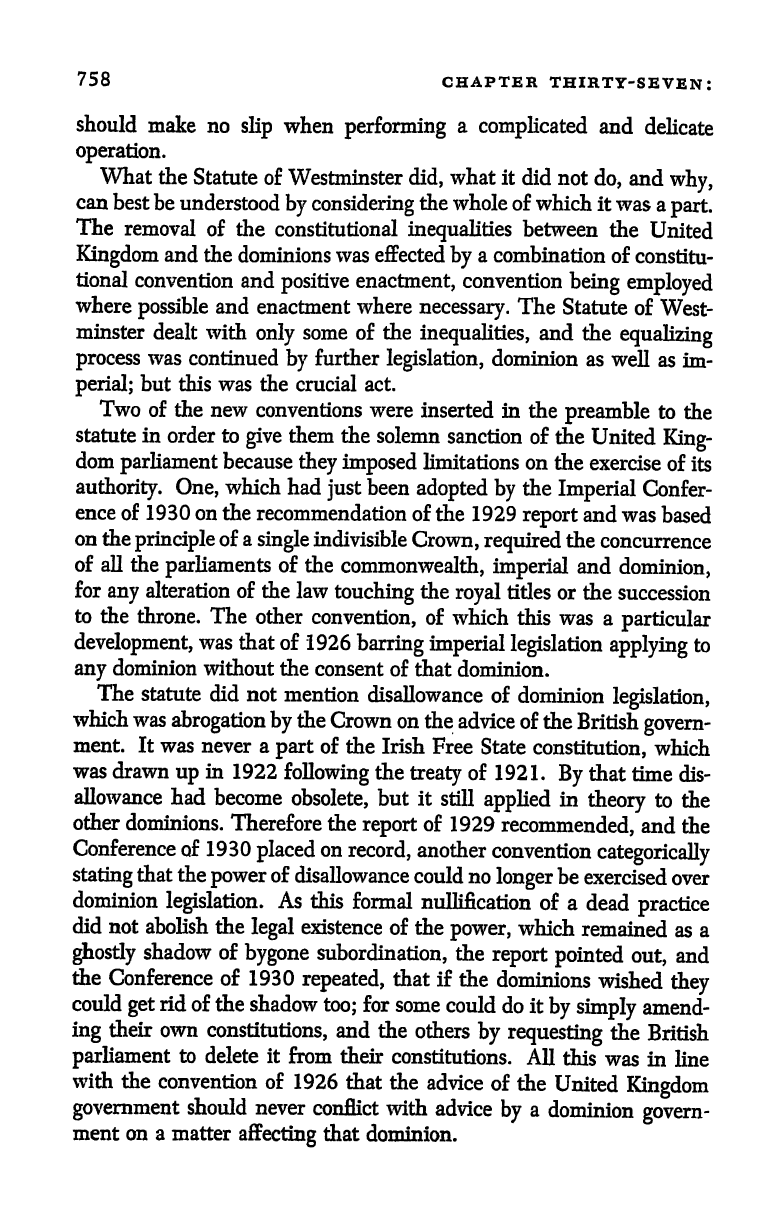
758
CHAPTER
THIRTY-SEVEN:
should
make no
slip
when
performing
a
complicated
and
delicate
operation.
What
the Statute
of
Westminster
did,
what
it
did
not
do,
and
why,
can
best
be
understood
by
considering
the
whole
of
which
it
was
a
part.
The
removal
of
the constitutional
inequalities
between
the
United
Kingdom
and
the
dominions was
effected
by
a
combination of
constitu-
tional
convention and
positive
enactment,
convention
being
employed
where
possible
and
enactment
where
necessary.
The
Statute
of
West-
minster
dealt
with
only
some of the
inequalities,
and
the
equalizing
process
was
continued
by
further
legislation,
dominion
as
well
as
im-
perial;
but this was the crucial act.
Two of the new
conventions
were
inserted in
the
preamble
to
the
statute in
order to
give
them
the
solemn
sanction
of the
United
King-
dom
parliament
because
they
imposed
limitations on
the
exercise
of
its
authority.
One,
which had
just
been
adopted
by
the
Imperial
Confer-
ence
of
1930 on the
recommendation
of
the
1929
report
and was
based
on
the
principle
of
a
single
indivisible
Crown,
required
the
concurrence
of
all the
parliaments
of the
commonwealth,
imperial
and
dominion,
for
any
alteration
of the law
touching
the
royal
titles or the
succession
to
the
throne.
The
other
convention,
of which
this
was a
particular
development,
was
that of
1926
barring
imperial
legislation
applying
to
any
dominion without
the
consent
of that
dominion.
The
statute
did
not
mention
disallowance
of
dominion
legislation,
which was
abrogation by
the
Crown
on the
advice
of
the
British
govern-
ment.
It was
never a
part
of the Irish
Free
State
constitution,
which
was drawn
up
in 1922
following
the
treaty
of
1921.
By
that
time
dis-
allowance
had
become
obsolete,
but it
still
applied
in
theory
to the
other
dominions.
Therefore
the
report
of
1929
recommended,
and
the
Conference
of
1930
placed
on
record,
another
convention
categorically
stating
that
the
power
of
disallowance
could no
longer
be
exercised
over
dominion
legislation.
As
this formal
nullification
of a
dead
practice
did not
abolish the
legal
existence
of the
power,
which
remained
as
a
ghostly
shadow of
bygone
subordination,
the
report
pointed
out,
and
the
Conference
of 1930
repeated,
that
if
the
dominions
wished
they
could
get
rid of the
shadow
too;
for some
could
do it
by
simply
amend-
ing
their own
constitutions,
and the
others
by
requesting
the
British
parliament
to delete it
from
their
constitutions.
All
this
was
in
line
with the
convention of
1926
that the
advice
of
the
United
Kingdom
government
should never
conflict
with
advice
by
a
dominion
govern-
ment
on a matter
affecting
that
dominion.
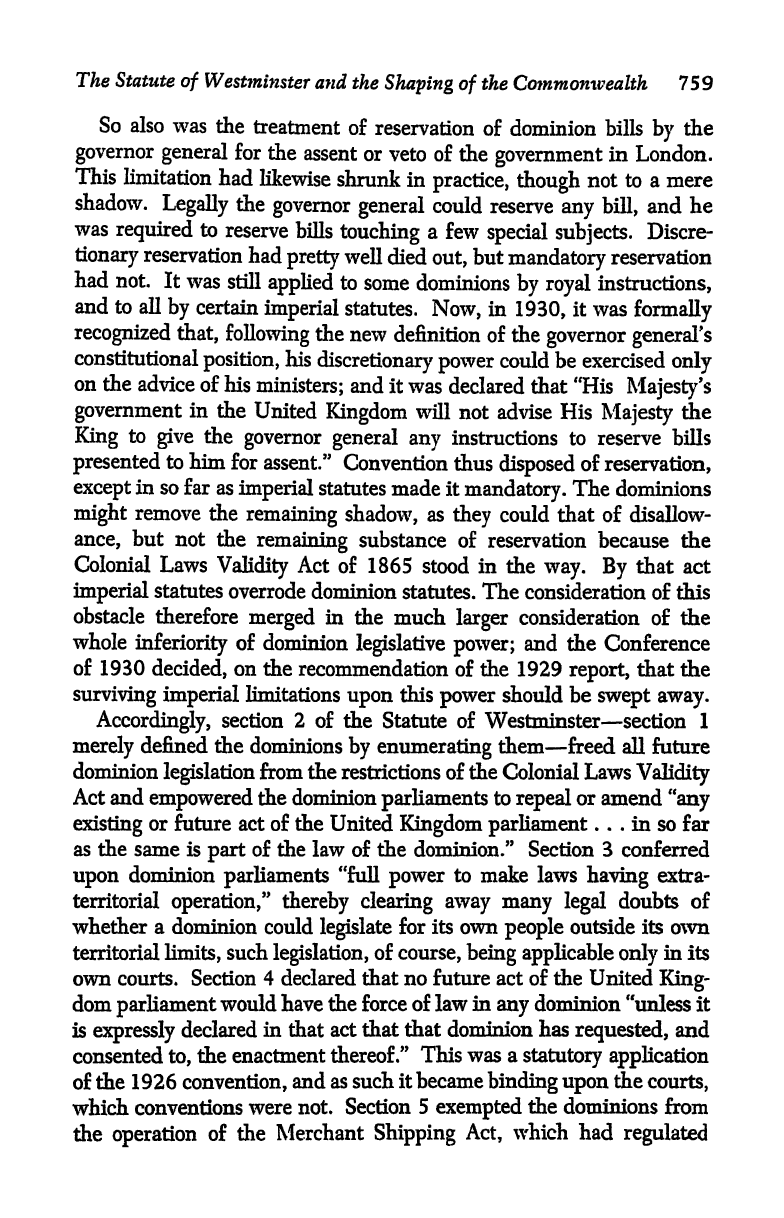
The Statute
of
Westminster
and
the
Shaping
of
the
Commonwealth
759
So also
was
the
treatment
of
reservation
of dominion
bills
by
the
governor
general
for
the
assent
or
veto
of
the
government
in London.
This
limitation
had
likewise
shrunk in
practice,
though
not to
a mere
shadow.
Legally
the
governor
general
could reserve
any
bill,
and
he
was
required
to
reserve
bills
touching
a few
special
subjects.
Discre-
tionary
reservation
had
pretty
well
died
out,
but
mandatory
reservation
had not.
It
was
still
applied
to
some
dominions
by
royal
instructions,
and to all
by
certain
imperial
statutes.
Now,
in
1930,
it
was
formally
recognized
that,
following
the
new
definition
of the
governor general's
constitutional
position,
his
discretionary
power
could be
exercised
only
on the
advice
of
his
ministers;
and it
was
declared
that "His
Majesty's
government
in
the
United
Kingdom
will not advise
His
Majesty
the
King
to
give
the
governor
general
any
instructions to
reserve bills
presented
to him
for
assent."
Convention
thus
disposed
of
reservation,
except
in so far
as
imperial
statutes
made it
mandatory.
The
dominions
might
remove
the
remaining
shadow,
as
they
could that of disallow-
ance,
but
not the
remaining
substance of
reservation because
the
Colonial Laws
Validity
Act
of
1865 stood
in
the
way.
By
that
act
imperial
statutes
overrode
dominion statutes. The
consideration of this
obstacle
therefore
merged
in the
much
larger
consideration
of the
whole
inferiority
of dominion
legislative power;
and the
Conference
of 1930
decided,
on the
recommendation
of
the
1929
report,
that the
surviving
imperial
limitations
upon
this
power
should
be
swept
away.
Accordingly,
section
2
of the
Statute
of
Westminster
section
1
merely
defined
the
dominions
by
enumerating
them
freed
all future
dominion
legislation
from the
restrictions of
the
Colonial
Laws
Validity
Act and
empowered
the
dominion
parliaments
to
repeal
or
amend
"any
existing
or
future act
of
the
United
Kingdom
parliament
...
in so far
as the
same
is
part
of
the
law
of
the
dominion." Section
3
conferred
upon
dominion
parliaments
"full
power
to
make
laws
having
extra-
territorial
operation,"
thereby
clearing
away
many
legal
doubts
of
whether
a
dominion
could
legislate
for its own
people
outside
its own
territorial
limits,
such
legislation,
of
course,
being
applicable only
in
its
own courts. Section
4
declared that no
future
act of the
United
King-
dom
parliament
would have the force
of
law
in
any
dominion
"unless it
is
expressly
declared
in
that
act that that dominion
has
requested,
and
consented
to,
the
enactment
thereof."
This was a
statutory
application
of
the 1926
convention,
and
as such it became
binding
upon
the
courts,
which conventions
were not.
Section
5
exempted
the
dominions
from
the
operation
of
the
Merchant
Shipping
Act,
which
had
regulated
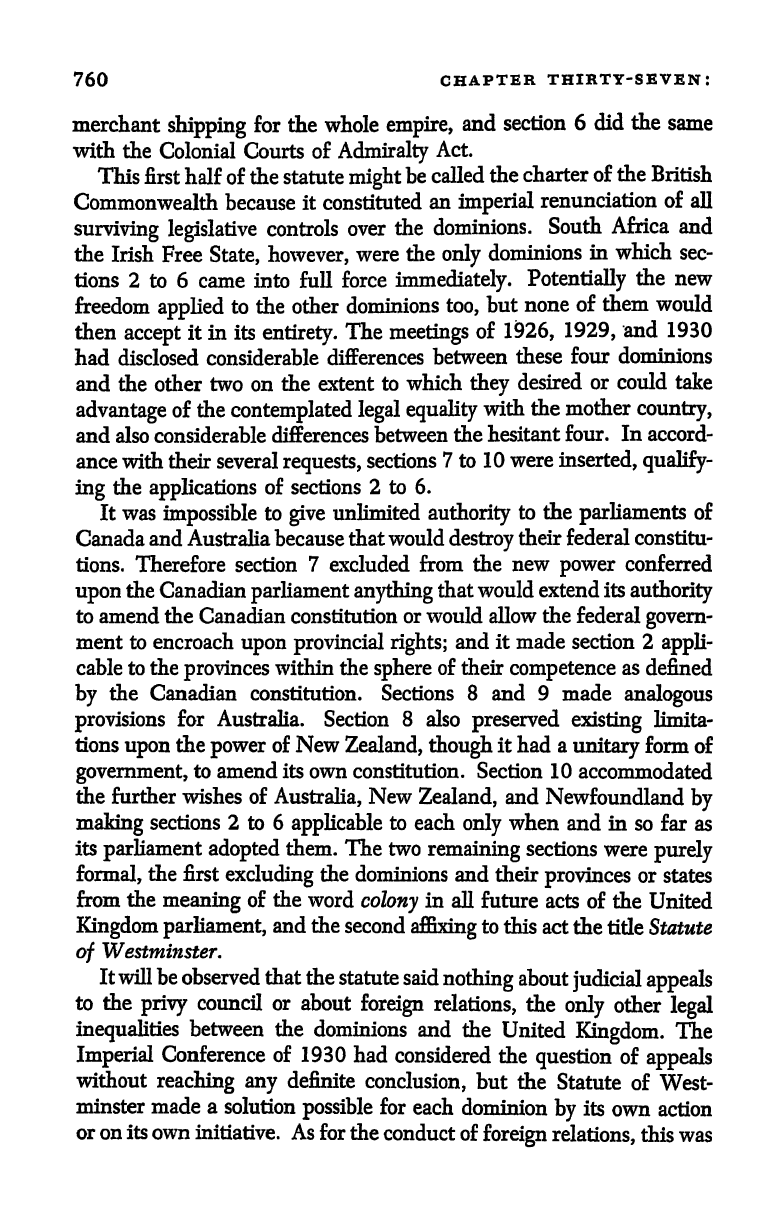
760
CHAPTER
THIRTY-SEVEN:
merchant
shipping
for
the whole
empire,
and
section
6 did
the
same
with the
Colonial Courts
of
Admiralty
Act.
This
first
half of
the statute
might
be
called
the
charter
of
the
British
Commonwealth
because
it constituted
an
imperial
renunciation
of
all
surviving legislative
controls
over
the
dominions.
South
Africa
and
the
Irish Free
State, however,
were
the
only
dominions
in
which
sec-
tions
2
to 6 came into full
force
immediately.
Potentially
the
new
freedom
applied
to the
other
dominions
too,
but
none
of
them
would
then
accept
it in its
entirety.
The
meetings
of
1926,
1929,
and 1930
had
disclosed considerable
differences
between
these
four dominions
and the
other
two on
the
extent
to
which
they
desired
or could
take
advantage
of the
contemplated legal
equality
with
the
mother
country,
and also considerable
differences between
the
hesitant
four. In
accord-
ance
with their several
requests,
sections
7
to
10
were
inserted,
qualify-
ing
the
applications
of
sections
2 to 6.
It was
impossible
to
give
unlimited
authority
to
the
parliaments
of
Canada
and
Australia
because
that would
destroy
their federal
constitu-
tions.
Therefore section
7
excluded
from the
new
power
conferred
upon
the Canadian
parliament anything
that would
extend its
authority
to
amend
the
Canadian constitution
or
would
allow
the
federal
govern-
ment
to encroach
upon
provincial
rights;
and
it made
section 2
appli-
cable to the
provinces
within the
sphere
of
their
competence
as
defined
by
the
Canadian constitution. Sections
8 and 9
made
analogous
provisions
for
Australia. Section
8
also
preserved
existing
limita-
tions
upon
the
power
of
New
Zealand,
though
it
had
a
unitary
form
of
government,
to
amend
its own constitution. Section 10
accommodated
the further
wishes
of
Australia,
New
Zealand,
and
Newfoundland
by
making
sections
2
to
6
applicable
to each
only
when
and
in
so far
as
its
parliament adopted
them.
The two
remaining
sections
were
purely
formal,
the
first
excluding
the dominions
and their
provinces
or states
from
the
meaning
of
the
word
colony
in
all future
acts
of
the
United
Kingdom parliament,
and
the
second
affixing
to
this
act
the
tide Statute
of
Westminster.
It
will
be observed
that the
statute
said
nothing
about
judicial
appeals
to
the
privy
council or
about
foreign
relations,
the
only
other
legal
inequalities
between the
dominions
and
the
United
Kingdom.
The
Imperial
Conference of 1930
had
considered
the
question
of
appeals
without
reaching
any
definite
conclusion,
but
the
Statute
of
West-
minster made
a
solution
possible
for
each
dominion
by
its
own
action
or on
its
own initiative.
As for
the
conduct
of
foreign
relations,
this was
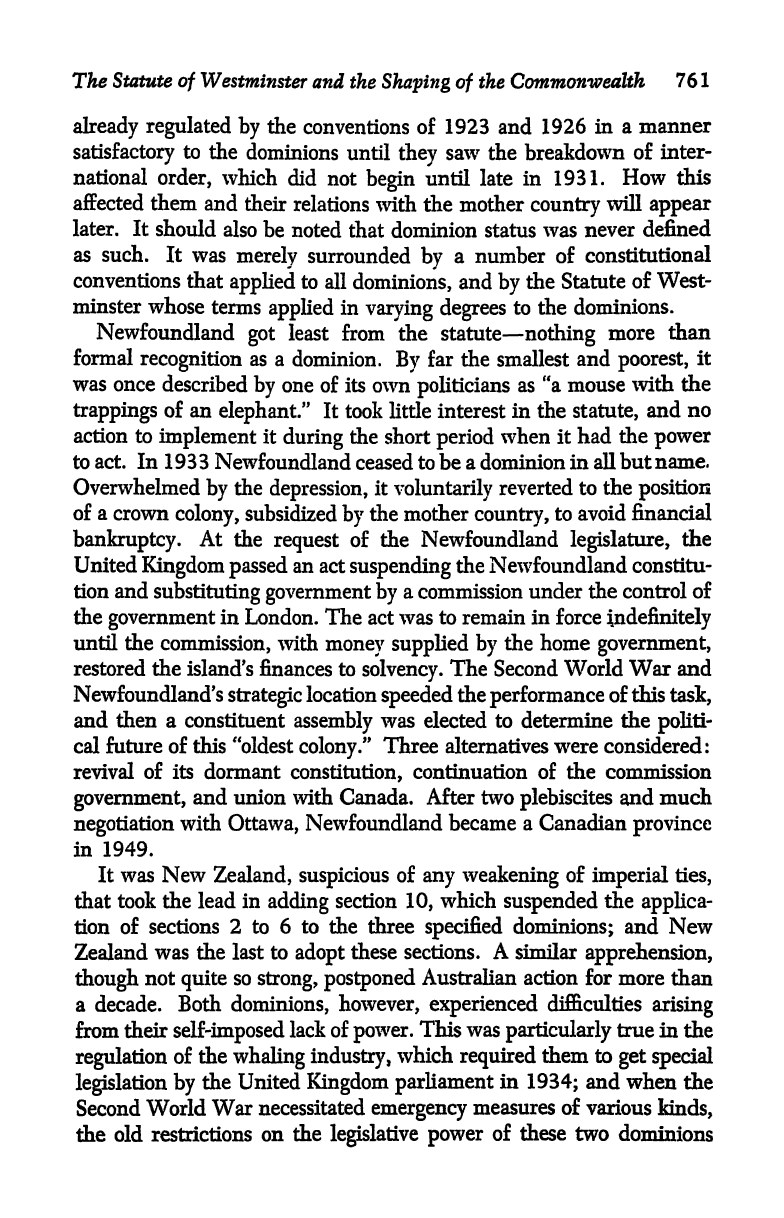
The
Statute
of
Westminster
and
the
Shading
of
the Commonwealth
76
1
already regulated
by
the
conventions
of 1923
and
1926
in
a manner
satisfactory
to
the
dominions until
they
saw the breakdown
of
inter-
national
order,
which
did not
begin
until
late
in
1931.
How
this
affected
them
and their
relations
with
the
mother
country
will
appear
later. It
should
also
be
noted that
dominion status
was
never
defined
as
such.
It was
merely
surrounded
by
a
number
of
constitutional
conventions
that
applied
to
all
dominions,
and
by
the Statute
of West-
minster
whose
terms
applied
in
varying degrees
to the
dominions.
Newfoundland
got
least
from
the statute
nothing
more
than
formal
recognition
as a
dominion.
By
far
the smallest
and
poorest,
it
was once
described
by
one
of
its own
politicians
as
"a mouse
with
the
trappings
of an
elephant."
It
took little
interest
in the
statute,
and
no
action to
implement
it
during
the
short
period
when it
had
the
power
to
act. In
1
9
3
3
Newfoundland ceased to be
a
dominion
in all
but
name.
Overwhelmed
by
the
depression,
it
voluntarily
reverted
to
the
position
of
a
crown
colony,
subsidized
by
the mother
country,
to avoid
financial
bankruptcy.
At
the
request
of the Newfoundland
legislature,
the
United
Kingdom
passed
an act
suspending
the
Newfoundland
constitu-
tion and
substituting
government
by
a
commission
under
the
control of
the
government
in
London. The act was
to remain
in
force
indefinitely
until the
commission,
with
money
supplied
by
the
home
government,
restored the
island's
finances
to
solvency.
The
Second
World
War and
Newfoundland's
strategic
location
speeded
the
performance
of
this
task,
and
then a constituent
assembly
was
elected
to
determine
the
politi-
cal future of this
"oldest
colony."
Three
alternatives
were considered:
revival of
its
dormant
constitution,
continuation of the commission
government,
and union with
Canada.
After two
plebiscites
and
much
negotiation
with
Ottawa,
Newfoundland became
a
Canadian
province
in
1949.
It
was
New
Zealand,
suspicious
of
any
weakening
of
imperial
ties,
that
took
the
lead
in
adding
section
10,
which
suspended
the
applica-
tion of
sections
2
to
6 to the
three
specified
dominions;
and New
Zealand
was the last
to
adopt
these sections.
A
similar
apprehension,
though
not
quite
so
strong, postponed
Australian action for
more
than
a decade.
Both
dominions,
however,
experienced
difficulties
arising
from
their
self-imposed
lack
of
power.
This
was
particularly
true in
the
regulation
of
the
whaling
industry,
which
required
them to
get special
legislation
by
the United
Kingdom parliament
in
1934;
and when
the
Second
World
War
necessitated
emergency
measures of
various
kinds,
the
old
restrictions
on
the
legislative
power
of these two
dominions
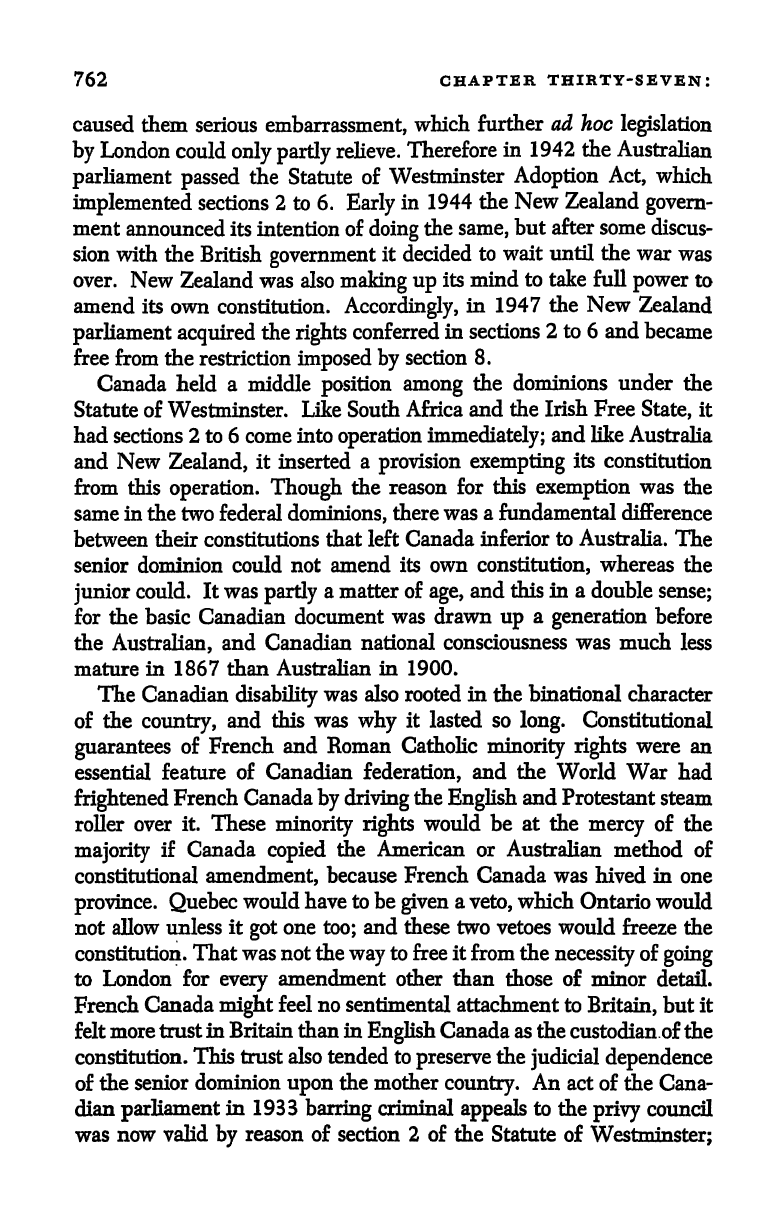
762
CHAPTER
THIRTY-SEVEN:
caused them serious
embarrassment,
which further
ad hoc
legislation
by
London
could
only
partly
relieve.
Therefore
in 1942
the
Australian
parliament
passed
the Statute
of
Westminster
Adoption
Act,
which
implemented
sections
2
to
6.
Early
in
1944
the
New Zealand
govern-
ment
announced its intention of
doing
the
same,
but
after some
discus-
sion with
the
British
government
it
decided
to
wait until the war
was
over.
New
Zealand
was also
making
up
its
mind
to take full
power
to
amend its
own constitution.
Accordingly,
in
1947
the New
Zealand
parliament
acquired
the
rights
conferred
in sections
2 to 6
and
became
free
from the restriction
imposed
by
section
8.
Canada
held
a middle
position among
the
dominions under
the
Statute of
Westminster.
Like South
Africa and
the Irish
Free
State,
it
had
sections
2 to
6 come
into
operation
immediately;
and like
Australia
and
New
Zealand,
it
inserted
a
provision
exempting
its
constitution
from
this
operation. Though
the
reason for
this
exemption
was
the
same
in
the two federal
dominions,
there
was
a
fundamental
difference
between
their constitutions
that left Canada
inferior
to
Australia.
The
senior dominion
could
not amend its own
constitution,
whereas
the
junior
could. It
was
partly
a matter of
age,
and
this in
a
double
sense;
for
the basic Canadian
document
was drawn
up
a
generation
before
the
Australian,
and Canadian
national consciousness
was
much
less
mature
in
1867
than
Australian
in 1900.
The
Canadian
disability
was also rooted
in
the
binational
character
of
the
country,
and
this
was
why
it lasted so
long.
Constitutional
guarantees
of French
and
Roman
Catholic
minority
rights
were
an
essential
feature
of Canadian
federation,
and the
World War
had
frightened
French
Canada
by driving
the
English
and
Protestant steam
roller over
it.
These
minority
rights
would be
at the
mercy
of the
majority
if
Canada
copied
the American
or Australian
method of
constitutional
amendment,
because French Canada was
hived
in
one
province.
Quebec
would
have to
be
given
a
veto,
which
Ontario
would
not allow
unless
it
got
one
too;
and these two vetoes
would freeze the
constitution.
That
was not the
way
to
free
it from the
necessity
of
going
to
London
for
every
amendment
other
than
those of minor
detail.
French
Canada
might
feel
no
sentimental attachment to
Britain,
but
it
felt
more
trust
in
Britain
than
in
English
Canada as the
custodian of the
constitution.
This trust
also
tended to
preserve
the
judicial dependence
of
the
senior
dominion
upon
the
mother
country.
An
act
of the
Cana-
dian
parliament
in 1933
barring
criminal
appeals
to the
privy
council
was
now
valid
by
reason of
section
2
of the Statute
of
Westminster;
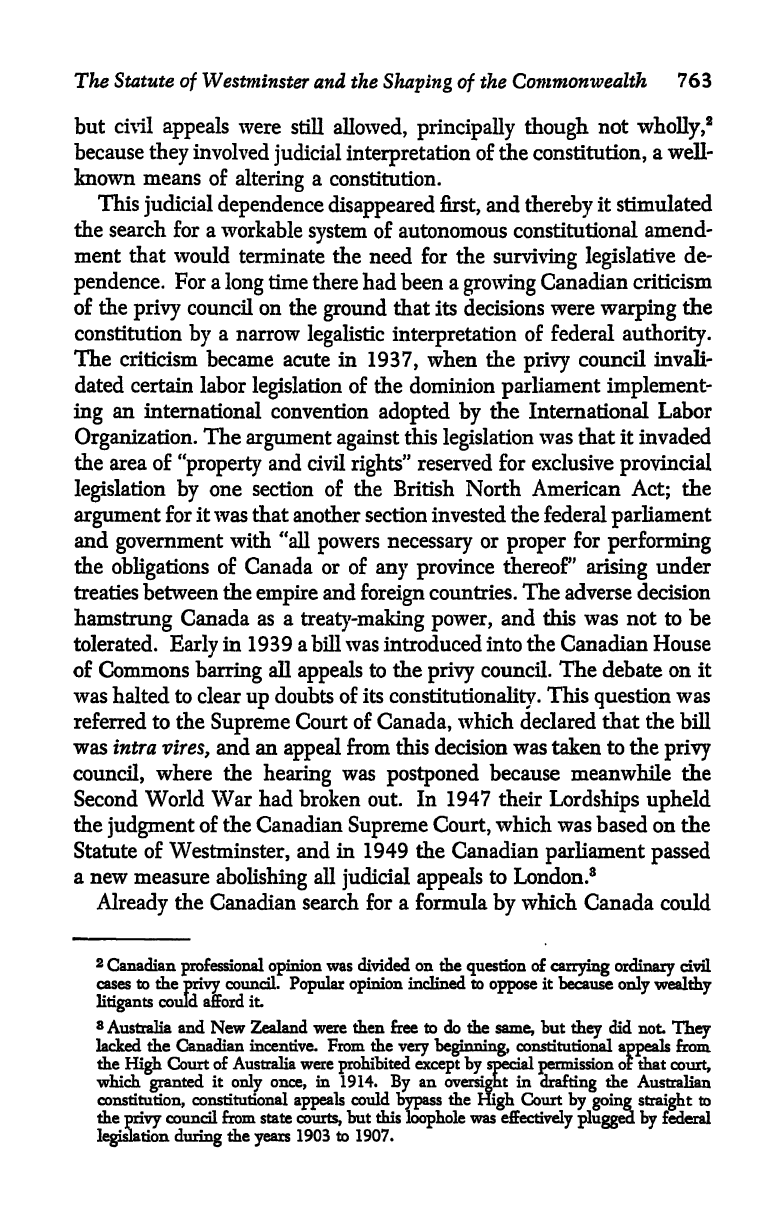
The
Statute
of
Westminster and
the
Shaping
of
the Commonwealth
763
but
civil
appeals
were
still
allowed,
principally
though
not
wholly,
2
because
they
involved
judicial
interpretation
of
the
constitution,
a well-
known
means
of
altering
a
constitution.
This
judicial
dependence
disappeared
first,
and
thereby
it stimulated
the search for
a
workable
system
of
autonomous
constitutional
amend-
ment
that
would
terminate the
need
for the
surviving
legislative
de-
pendence.
For a
long
time
there had
been
a
growing
Canadian
criticism
of the
privy
council
on
the
ground
that
its
decisions
were
warping
the
constitution
by
a
narrow
legalistic interpretation
of federal
authority.
The
criticism
became acute in
1937,
when
the
privy
council
invali-
dated certain
labor
legislation
of the dominion
parliament
implement-
ing
an
international convention
adopted
by
the
International Labor
Organization.
The
argument against
this
legislation
was
that
it
invaded
the area of
"property
and civil
rights"
reserved
for
exclusive
provincial
legislation
by
one section of the British North
American
Act;
the
argument
for
it was that
another section
invested the federal
parliament
and
government
with "all
powers
necessary
or
proper
for
performing
the
obligations
of Canada or
of
any province
thereof
'
arising
under
treaties
between
the
empire
and
foreign
countries. The adverse decision
hamstrung
Canada
as a
treaty-making
power,
and
this was
not
to
be
tolerated.
Early
in 1939
a
bill
was
introduced
into
the
Canadian
House
of
Commons
barring
all
appeals
to
the
privy
council. The debate
on it
was
halted to clear
up
doubts
of
its
constitutionality.
This
question
was
referred
to
the
Supreme
Court
of
Canada,
which
declared
that the
bill
was intra
vires,
and
an
appeal
from this decision
was
taken to the
privy
council,
where the
hearing
was
postponed
because meanwhile the
Second
World
War had
broken
out. In
1947
their
Lordships upheld
the
judgment
of the
Canadian
Supreme
Court,
which was
based
on
the
Statute of
Westminster,
and
in 1949
the
Canadian
parliament
passed
a new
measure
abolishing
all
judicial appeals
to
London.
3
Already
the
Canadian search for
a formula
by
which
Canada
could
2
Canadian
professional
opinion
was divided on the
question
of
carrying ordinary
civil
cases to the
privy
council.
Popular opinion
inclined to
oppose
it because
only
wealthy
litigants
could afford
it.
8
Australia
and
New
Zealand were then
free
to
do the
same,
but
they
did
not.
They
lacked the
Canadian
incentive.
From the
very
beginning,
constitutional
appeals
from
the
High
Court
of
Australia were
prohibited
except by special
permission
of that
court,
which
granted
it
only
once,
in
1914.
By
an
oversight
in
drafting
the
Australian
constitution,
constitutional
appeals
could
bypass
the
High
Court
by
going
straight
to
the
privy
council from state
courts,
but
this
loophole
was
effectively
plugged
by
federal
legislation during
the
years
1903 to 1907.
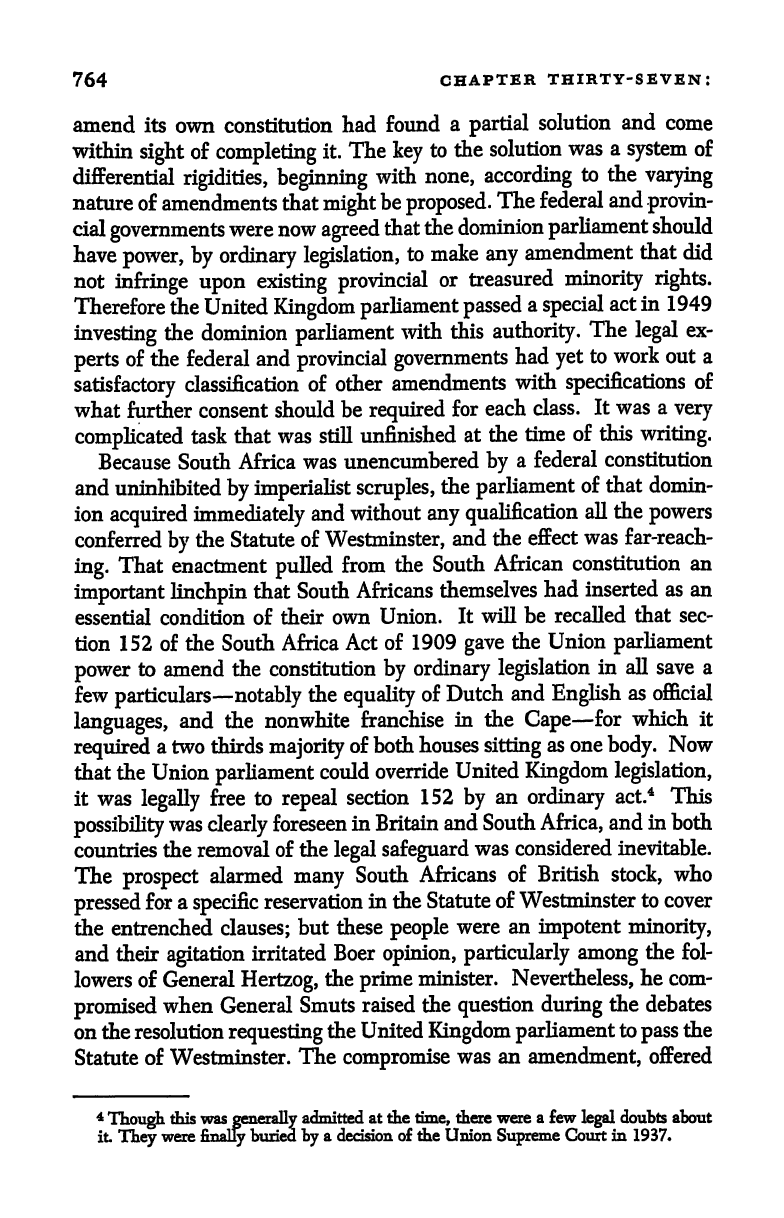
764
CHAPTER
THIRTY-SEVEN:
amend
its
own
constitution
had
found
a
partial
solution
and
come
within
sight
of
completing
it.
The
key
to
the
solution
was
a
system
of
differential
rigidities, beginning
with
none,
according
to the
varying
nature
of
amendments
that
might
be
proposed.
The
federal
and
provin-
cial
governments
were
now
agreed
that
the dominion
parliament
should
have
power, by ordinary
legislation,
to
make
any
amendment
that
did
not
infringe
upon
existing
provincial
or
treasured
minority
rights.
Therefore the
United
Kingdom
parliament
passed
a
special
act in
1949
investing
the dominion
parliament
with
this
authority.
The
legal
ex-
perts
of
the federal and
provincial
governments
had
yet
to
work
out a
satisfactory
classification
of other
amendments
with
specifications
of
what
further consent
should
be
required
for
each
class.
It
was
a
very
complicated
task
that was
still
unfinished
at
the
time of
this
writing.
Because South
Africa
was unencumbered
by
a federal
constitution
and
uninhibited
by imperialist
scruples,
the
parliament
of
that domin-
ion
acquired
immediately
and
without
any qualification
all
the
powers
conferred
by
the Statute
of
Westminster,
and
the
effect
was far-reach-
ing.
That
enactment
pulled
from
the
South
African
constitution
an
important
linchpin
that
South
Africans
themselves
had
inserted
as
an
essential condition
of
their
own
Union.
It
will be
recalled
that sec-
tion
152 of
the
South
Africa
Act
of
1909
gave
the
Union
parliament
power
to amend
the
constitution
by
ordinary legislation
in all save a
few
particulars
notably
the
equality
of
Dutch
and
English
as official
languages,
and
the
nonwhite
franchise
in
the
Cape
for
which
it
required
a two
thirds
majority
of
both houses
sitting
as one
body.
Now
that
the Union
parliament
could
override
United
Kingdom legislation,
it was
legally
free
to
repeal
section
152
by
an
ordinary
act.
4
This
possibility
was
clearly
foreseen
in Britain
and
South
Africa,
and
in
both
countries
the
removal
of the
legal
safeguard
was
considered
inevitable.
The
prospect
alarmed
many
South
Africans of
British
stock,
who
pressed
for
a
specific
reservation
in
the
Statute of Westminster
to cover
the entrenched
clauses;
but these
people
were an
impotent
minority,
and their
agitation
irritated
Boer
opinion,
particularly among
the fol-
lowers of
General
Hertzog,
the
prime
minister.
Nevertheless,
he com-
promised
when
General
Smuts
raised
the
question during
the
debates
on
the resolution
requesting
the United
Kingdom
parliament
to
pass
the
Statute
of Westminster.
Tlie
compromise
was an
amendment,
offered
4
Though
this was
generally
admitted
at
the
time,
there were
a
few
legal
doubts about
it.
They
were
finally
buried
by
a decision of the Union
Supreme
Court in
1937.
